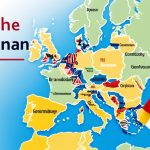Welcome to our comprehensive guide on navigating the Portuguese job market. If you’re considering working in Portugal, it’s essential to have a solid understanding of the employment basics in the country. In this section, we’ll provide you with valuable insights and tips to help you kickstart your journey towards Portuguese employment.
Understanding the Portuguese Job Market
When it comes to finding employment in Portugal, it’s essential to have a good grasp of the local job market. In this section, we will explore the current employment landscape in Portugal and highlight key industries that offer promising opportunities for job seekers.
The Portuguese job market is diverse, with various sectors contributing to the country’s economy. Industries such as tourism, technology, renewable energy, and services play a significant role in providing employment opportunities. Understanding which sectors are thriving and in-demand can give you a competitive edge in your job search.
Furthermore, comprehending the local work culture is crucial when navigating the Portuguese job market. Portuguese work culture values interpersonal relationships and emphasizes teamwork, which is often reflected in the hiring process and workplace dynamics.
Employers in Portugal appreciate candidates who are adaptable, collaborative, and possess strong communication skills. Demonstrating an understanding of the local work culture can significantly improve your chances of securing employment and fitting in well within the company culture.
If you are considering working in Portugal, taking the time to grasp the unique characteristics of the job market and local work culture will undoubtedly set you on the path to success.
Job Hunting in Portugal
Looking for employment opportunities in Portugal? We’ve got you covered with our valuable job hunting tips and strategies. From crafting a strong CV/resume to leveraging online platforms and networking, we’ll help you navigate the Portuguese job market with confidence.
Building a Strong CV/Resume
Your CV/resume is your chance to grab the attention of potential employers. Make sure to highlight your relevant skills, qualifications, and experience. Tailor your CV/resume to the job you’re applying for and include keywords that are specific to the industry. Don’t forget to proofread for any spelling or grammatical errors.
Leveraging Online Platforms and Networking
The internet provides various platforms for job seekers in Portugal. Consider creating professional profiles on LinkedIn and local job boards to showcase your skills and connect with potential employers. Actively engage in industry-related discussions and join networking events to expand your professional contacts.
The Best Approaches for Job Applications and Interviews
When applying for jobs, always tailor your application to the specific role and company. Research the company thoroughly and customize your cover letter to highlight how your skills align with their values and goals. Prepare for interviews by practicing common interview questions and showcasing your enthusiasm for the position.
Remember, job hunting can be a process, and it’s important to stay motivated and persistent. By following our job hunting tips, you’ll increase your chances of finding exciting employment opportunities in Portugal.
Legal Aspects of Working in Portugal
When it comes to working in Portugal, it’s essential to understand the legal framework and work regulations in place. This section will explore the key aspects that every employee and employer should be aware of, ensuring compliance and a smooth working experience.
Important Regulations and Contracts
Portugal has specific regulations in place that govern various aspects of employment. From the length of working hours to holiday entitlements, these regulations ensure fair treatment for employees.
Employment contracts play a significant role in establishing the rights and obligations of both parties. They outline the terms of employment, including job description, salary, working hours, and other crucial details. It’s important for both employers and employees to understand and adhere to these contracts.
Working Hours and Breaks
Portuguese employment law dictates the maximum number of working hours per week, providing protection for employees’ well-being and work-life balance. Most employees work 40 hours a week, with the standard being eight hours per day, five days a week. However, variations may exist depending on the industry and employment agreement.
Lunch breaks are typically mandatory, with a minimum duration of one hour for employees working more than six hours per day. Shorter breaks may apply for those working fewer hours, but it’s crucial to ensure that employees are given adequate rest periods throughout the day.
Holiday Entitlement
In Portugal, employees are entitled to paid annual leave, allowing them to rest and recharge. The amount of holiday entitlement depends on the length of service and is usually calculated based on the number of days worked in the previous year.
It’s important for both employers and employees to understand the rules surrounding holiday entitlement, including the notice period required for taking leave and any restrictions that may apply during peak periods or business needs.
Understanding the legal framework and work regulations in Portugal is crucial for both employees and employers. By adhering to these regulations and ensuring compliance with employment contracts, individuals can navigate the Portuguese job market with ease and confidence.
E-Commerce Opportunities in Portugal
Are you an aspiring entrepreneur or a professional looking to enter the e-commerce sector? Look no further than Portugal! The country offers exciting opportunities and a thriving e-commerce market for those seeking to join the digital revolution.
Portugal’s e-commerce sector has witnessed impressive growth in recent years, presenting a wealth of possibilities for both local and international businesses. With a tech-savvy population and increasing online consumerism, the Portuguese market provides a fertile ground for e-commerce ventures to flourish.
When it comes to e-commerce in Portugal, there are key players who have established a strong presence in the market. Companies such as Worten.pt, Fnac.pt, and Continente.pt have successfully tapped into the growing demand for online shopping, offering a diverse range of products and services.
As an aspiring entrepreneur or professional, you can take advantage of various opportunities in the Portuguese e-commerce sector. Whether you’re interested in launching your own online store, offering specialized services, or working with established e-commerce platforms, Portugal provides a favorable environment to thrive in the digital marketplace.
So, why not consider the exciting possibilities that Portugal’s e-commerce market has to offer? Unlock your entrepreneurial potential and explore the vast opportunities available in this dynamic industry.
Work-Life Balance in Portugal
Work-life balance is crucial for overall well-being and plays a significant role in our daily lives. In Portugal, the importance of achieving a healthy balance between work and personal life is highly valued.
When it comes to work hours, the typical full-time workweek in Portugal consists of 40 hours, spread over five days. Most companies follow a standard schedule from Monday to Friday, with flexibility depending on the industry and individual work arrangements.
One of the key aspects of work-life balance in Portugal is the generous vacation time. Generally, employees are entitled to 22 paid vacation days per year. Additionally, there are public holidays and other types of leave, such as parental leave, that are provided to ensure employees can prioritize their personal and family responsibilities.
Cultural perspectives also contribute to the work-life balance ethos in Portugal. The Portuguese culture emphasizes the importance of family, leisure, and enjoying quality time with loved ones. This mindset encourages individuals to maintain a healthy separation between work and personal life, allowing for relaxation and rejuvenation outside of working hours.
Having a healthy work-life balance is not only valued by employees but also seen as essential for productivity and overall satisfaction in the workplace. Employers in Portugal understand the benefits of ensuring their workforce has time for personal interests and commitments, resulting in increased motivation and well-being.
It’s worth noting that achieving work-life balance can vary depending on the industry, job position, and individual circumstances. It’s important for individuals to assess their own needs and priorities to seek the right balance that works for them.
Next, we will explore the challenges and strategies for overcoming language barriers when seeking and maintaining employment in Portugal.
Overcoming Language Barriers
Language proficiency plays a vital role in securing employment, especially in a foreign country like Portugal. However, language barriers can be a significant challenge for job seekers. It’s essential to understand the strategies for overcoming these obstacles and effectively communicate in the workplace.
When seeking employment in Portugal, it’s essential to have a good command of the Portuguese language. While English is spoken and understood by many professionals, having fluency in Portuguese can give you a competitive edge and open doors to a wider range of job opportunities.
One effective way to overcome language barriers is by enrolling in Portuguese language courses. These courses can help you improve your vocabulary, grammar, and pronunciation. Additionally, they provide cultural insights that can facilitate better integration into the local work environment.
Another strategy is to engage in language exchange programs or find language partners. This allows you to practice Portuguese with native speakers while helping them improve their English or another language. Language exchange platforms and local meetup groups can be great resources for finding language partners.
Furthermore, immerse yourself in the Portuguese culture and language. Watch Portuguese movies or TV shows, listen to Portuguese music, and try to incorporate Portuguese into your daily life. This immersive experience will accelerate your language learning process and help you become more comfortable communicating in a Portuguese-speaking work environment.
When applying for jobs, make sure your CV and cover letter are properly translated into Portuguese. Highlight your language skills and any relevant experiences or certifications you have acquired. Emphasize your commitment to learning and improving your language proficiency.
During interviews, demonstrate your willingness to adapt and learn by actively listening and responding in Portuguese. Employers appreciate candidates who actively engage in the local language and culture, as it shows dedication and respect.
Finally, don’t be discouraged by difficulties or mistakes along the way. Language learning is a continuous process, and everyone progresses at their own pace. Embrace the challenges and stay motivated. With time and practice, you will overcome language barriers and thrive in the Portuguese work environment.
By taking proactive steps to improve your language skills and integrating into the local culture, you can enhance your employability and create opportunities for personal and professional growth in Portugal.
Work Visa and Residency Requirements
If you’re considering working in Portugal, it’s important to understand the work visa and residency requirements for foreigners. To legally work and reside in the country, you will need to go through the necessary application process and provide the required documentation.
Obtaining a work visa typically involves securing a job offer from a Portuguese employer, as they will need to sponsor your visa application. Additionally, you may need to demonstrate your qualifications and skills that are in demand in Portugal.
When applying for residency, you’ll need to gather documents such as a valid passport, proof of employment, proof of accommodation, and proof of sufficient financial means to support yourself while in the country. The application process may vary depending on your nationality, so it’s crucial to check the specific requirements and guidelines.
Portugal offers several avenues for obtaining legal permission to work and reside in the country, including the EU Blue Card, which is designed for highly qualified professionals, and the Tech Visa, which is specifically for those working in the technology sector. Consulting with an immigration lawyer or contacting the Portuguese embassy or consulate can provide you with the most up-to-date information and guidance throughout the process.














